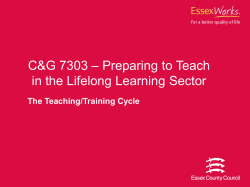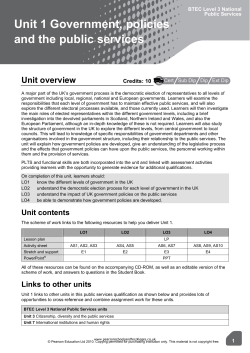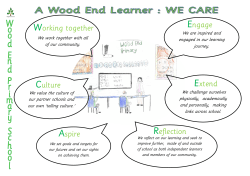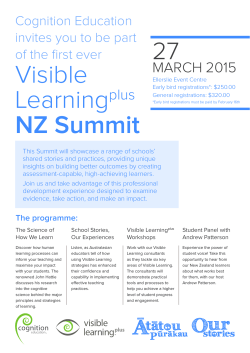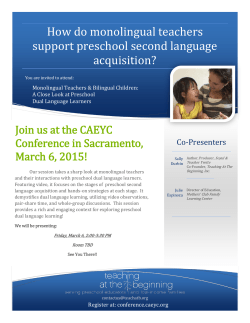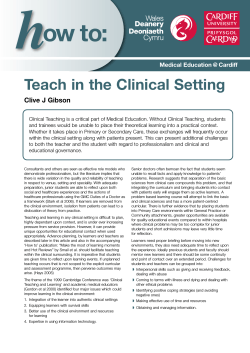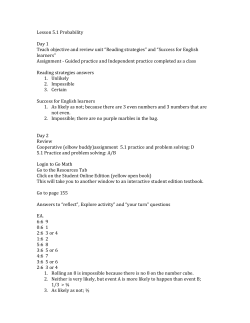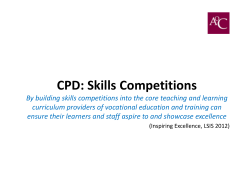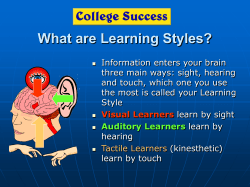
Resources for Supporting Teachers and Administrators to
CENTER ON ENHANCING EARLY LEARNING OUTCOMES CEELO Annotated Bibliography: Resources for Supporting Teachers and Administrators to Improve Outcomes for Dual Language Learners in Pre-K through Third Grade Lori Connors-Tadros, PhD and Michelle Horowitz, BA March 2015 This document identifies selected resources on best practices and policy to support effective teaching and learning for dual language learners (DLL) in early childhood programs and early elementary school. Click on the topic below to go directly to that section of the selected resources. Research on Best Practices Policy Briefs Survey Resources Webinars Research on Best Practices Dual Language Learners: Research Informing Policy Castro, D.C., Garcia, E.E. & Markos, A.M. (2013). Dual language learners: Research informing policy. Chapel Hill: The University of North Carolina, Frank Porter Graham Child Development Institute, Center for Early Care and Education - Dual Language Learners. This paper provides a foundational understanding on dual language learners, current research on the development of dual language learners, and the cognitive benefits of being bilingual. Suggestions are given on how research can highlight federal, state, and local policy pathways to influence DLL initiatives, and how to coordinate policies and practices to better support the learning of DLLs. Best Practices for Supporting Teachers and Administrators to Improve Outcomes for Dual Language Learners in PK-Grade 3 Connors-Tadros, L. & Figueras-Daniel, A. (2015, February). Best practices for supporting teachers and administrators to improve outcomes for dual language learners in pK-grade 3. New Brunswick, NJ: Center on Enhancing Early Learning Outcomes. 1 CENTER ON ENHANCING EARLY LEARNING OUTCOMES Lori Connors-Tadros and Alexandra Figueras-Daniel gave this presentation on February 25, 2015 at the Winter Meeting of the Council of Chief State School Officer’s, English Language Learners State Collaborative on Assessment and Student Standards (SCASS). The presentation highlights best practice for teachers and administrators to support development of English and children’s home language, shared a tool for coaching and professional development of teachers, and discuss policy trends and recommendations for improving outcomes of dual language learner children. Better Policies for Dual Language Learners: Bridging Research, Policy, Implementation, and Classroom Practice Williams, C.P. (2015). Better policies for dual language learners: Bridging research, policy, implementation, and classroom practice. Washington, DC: New America Foundation This brief offers a summary of the work of the New America Foundation’s Dual Language Learners’ work group. The paper identifies best practices for DLL’s, areas of substantive agreement on best practices, and areas where DLL stakeholders disagree. California’s Best Practices for Young Dual Language Learners: Research Overview Papers Governor’s State Advisory Council on Early Learning and Care. (2013). California’s best practices for young dual language learners: Research overview papers. Sacramento, CA: California Department of Education. This series of research papers focuses on different aspects of the development of dual language learners. Information from the research guided the formulation of best practices for supporting DLL learning and development in California. Enhancing Young Hispanic Dual Language Learners' Achievement Ackerman, D.J. & Tazi, Z.T. (2015). Enhancing young Hispanic dual language learners’ achievement: Exploring strategies and addressing challenges. Princeton, NJ: Educational Testing Service. This report from the Educational Testing Service (ETS) looks at key factors contributing to the academically at-risk status of young Hispanic dual language learners (DLLs) and describes current research on strategies for supporting the learning and development of young DLLs in early education programs. The report also discusses the practical implementation challenges that must be addressed to successfully incorporate promising strategies. 2 CENTER ON ENHANCING EARLY LEARNING OUTCOMES Policy Briefs PreK-3rd: Challenging Common Myths About Dual Language Learners Espinosa, L.M. (2013). PreK-3rd: Challenging common myths about dual language learners. New York, NY: Foundation for Child Development. This policy brief presents five commonly held beliefs about the development and learning of DLLs and provides research evidence to better guide policies. Chaos for Dual Language Learners: An Examination of State Policies for Exiting Children from Language Services in the PreK-3rd Grade Williams, C.P. (2014). Chaos for dual language learners: An examination of state policies for exiting children from language services in the preK-3rd grade. Washington, DC: New American Foundation This paper discusses current reclassification policies, which aim to determine who will receive continued language supports after their early education. Recent research and existing state policies are surveyed to determine best practices for DLL reclassification into mainstream classroom settings. Preparing Young Hispanic Dual Language Learners for a Knowledge Economy Figueras-Daniel, A., Barnett, W.S. (2013). Preparing young Hispanic dual language learners for a knowledge economy. New Brunswick, NJ: The National Institute for Early Education Research. NIEER’s policy brief addresses issues of access and quality in Hispanic and other immigrant groups’ children. The authors aim to address how best practices can be incorporated into programs and policies and what has been learned from research on addressing the needs of Hispanic preschool aged children. English Language Learners: A Growing-Yet Underserved-Student Population Education Commission of the States. (2013). English language leaners: A growing-yet underservedstudent population. The Progress of Education Reform, 14 (6), 1-7. As the number of DLLs has grown, the need for reforms to accommodate these young learners has exponentially increased. This brief outlines what we know and what we’ve learned about educating children with English as a second language. 3 CENTER ON ENHANCING EARLY LEARNING OUTCOMES Training to Screen Young English Language Learners and Dual Language Learners for Disabilities Schilder, D. (2013). Training to screen young English language learners and dual language learners for disabilities. New Brunswick, NJ: Center on Enhancing Early Learning Outcomes. This document recommends experts in the field of assessing young children who are English Language Learners (ELL) to train administrators and psychologists working in district preschool programs for young children with special needs. Ensuring High Quality Early Care and Education to Support New York’s Dual Language Learners and their Families The Committee for Hispanic Children and Families, Inc Latino Coalition for Early Care and Education. (2014). Ensuring high quality early care and education to support New York’s dual language learners and their families. New York, NY: Author New York City’s universal preschool initiative means the addition of many dual language learners into the classroom. The Committee for Hispanic Children and Families, Inc., and the Latino Coalition for Early Care and Education make several recommendations for ensuring these children and families are being provided services to promote learning. Instructional Practices That Support ELL Children in Los Angeles Universal Preschool Classrooms Atkins-Burnett, S., Moiduddin, E., Aikens, N., Xue, Y., Samkian, A., & Murphy, S. (2012). Instructional practices that support ELL children in Los Angeles universal preschool classrooms (No. 7594). Los Angeles, CA: First 5 LA. This brief describes instructional practices that support ELLs and findings on how these practices are applied in LAUP classrooms and family child care programs. Survey Resources The English Language Learner Program Survey for Principals Grady, M.W. & O’Dwyer, L.M. (2014). The English language learner program survey for principals. Washington, DC: U.S. Department of Education, Institute of Education Sciences, National Center for Education Evaluation and Regional Assistance, Regional Educational Laboratory Northeast & Islands. This survey tool was designed for school principals, with the goal of helping state education departments collect data on the education of English language learner students. The survey includes school-level policies and practices for education English language learner students; professional 4 CENTER ON ENHANCING EARLY LEARNING OUTCOMES development advice on educating DLLs that principals are currently receiving and would like to receive; state guidelines and standards; and principals’ beliefs on educating DLL students. Webinars Young Immigrants and Dual Language Learners: Participation in Pre-K & Gaps at Kindergarten Entry Barnett, W.S. & Nores, M. (2014, November 13). Young immigrants and dual language learners: Participation in pre-k & gaps at kindergarten entry webinar. New Brunswick, NJ: Center on Enhancing Early Learning Outcomes. This webinar presents data on how children from various language and immigrant backgrounds participate in pre-K programs and how they perform relative to their White peers at Kindergarten entry. Development of the CECER-DLL Parent and Teacher Questionnaires: New Tools for Characterizing Preschool DLL’s Experiences Hammer, C.S., Scarpino, S.E. & Cycyk, L.M. (2014, March 14). Development of the CECER-DLL Parent and Teacher Questionnaires: New tools for characterizing preschool DLL’s experiences [Webinar Recording]. Chapel Hill, NH: Center for Early Care and Education Research-Dual Language Learners. This webinar hosted by the Center for Early Care and Education Research-Dual Language Learners documents the characteristics of dual language learners, their families, classrooms, and experiences with their two languages. This webinar focuses on the content of questionnaires given to parents and teachers about DLL characteristics and preliminary findings from the study. 5 CENTER ON ENHANCING EARLY LEARNING OUTCOMES ABOUT CEELO: One of 22 Comprehensive Centers funded by the U.S. Department of Education’s Office of Elementary and Secondary Education, the Center on Enhancing Early Learning Outcomes (CEELO) will strengthen the capacity of State Education Agencies (SEAs) to lead sustained improvements in early learning opportunities and outcomes. CEELO will work in partnership with SEAs, state and local early childhood leaders, and other federal and national technical assistance (TA) providers to promote innovation and accountability. For other CEELO Policy Reports, Policy Briefs, FastFacts, and Annotated Bibliographies go to http://ceelo.org/ceelo-products/. This annotated bibliography was produced by the Center on Enhancing Early Learning Outcomes, with funds from the U.S. Department of Education under cooperative agreement number S283B120054. The content does not necessarily reflect the position or policy of the Department of Education, nor does mention or visual representation of trade names, commercial products, or organizations imply endorsement by the federal government. The Center on Enhancing Early Learning Outcomes (CEELO) is a partnership of the following organizations: 6
© Copyright 2025
